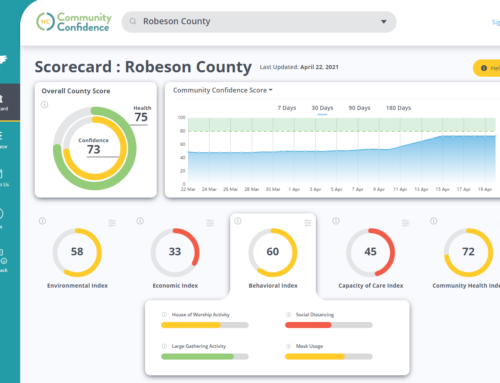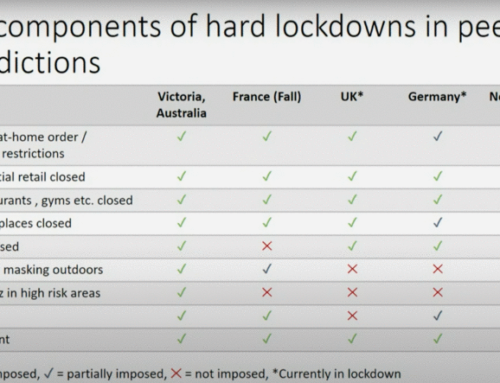– Tool to help counties make data-driven decisions for reopening –
“Community Confidence™ will provide a local data-driven scorecard to support decision makers on when and how communities and businesses should reopen. It is our hope that this scorecard will prove critical in facilitating the safe and successful reopening of communities across the state.”
[Chapel Hill, NC, January 8, 2020] Digital Health Institute for Transformation (DHIT), with funding support from the North Carolina Policy Collaboratory, officially released its Community Confidence™ tool across seven North Carolina counties, including Ashe, Buncombe, Gates, Mecklenburg, New Hanover, Robeson and Wake.
DHIT announced its vision of the Community Confidence tool this summer after the organization, as part of the 2020 COVID-19 Recovery Act, received a grant from the Collaboratory to research, validate and build a community dashboard and recommendation engine to support community and business leaders from across North Carolina in navigating decisions and conversations around reopening.
Community Confidence™ is driven by a robust and novel computational model for US counties that incorporates a wide variety of scientific datasets including population health, capacity of care, economic data, environmental data, and social and attitudinal data. Using the tool, community and business leaders are able to simulate the impact and tradeoff of implementing recommendations to safeguard their population and gain valuable insights on how sectors of the economy can reopen and stay open safely.
Uniquely, the model includes a comprehensive survey of North Carolina residents at the county level which was conducted using Discrete Choice Experiment methodology to understand community preferences, attitudes and tolerance towards policymakers’ decisions during the pandemic.
“This pandemic has stretched on for 10 months with no clear playbook to follow when considering how to successfully reopen our economy while still preserving the health and preferences of the community,” said Michael Levy, president, DHIT. “Community Confidence™ will provide a local data-driven scorecard to support decision makers on when and how communities and businesses should reopen. It is our hope that this scorecard will prove critical in facilitating the safe and successful reopening of communities across the state.”
Jeff Warren, Executive Director of the Collaboratory, commented: “For the first time during this pandemic, we are finally beginning to gain the necessary confidence that decisions being made that consider both the public health and economic resilience of our communities can be based on robust data, have a positive impact, and receive broad acceptance.”
For further information, visit communityconfidence.org.
ABOUT DHIT
The Digital Health Institute for Transformation (DHIT) is a 501(c)(3) non-profit education and research institute supporting communities through the process of digital health transformation. We collaborate with leading academic institutions, associations, and industry to cultivate talent and ecosystems with our immersive learning platform, harnessing real-world experiences that drive the adoption of next-generation skills, emerging technologies, and mindsets needed to foster the digital health leaders and innovators of the future, today. For more information, visit dhitglobal.org.
ABOUT THE NORTH CAROLINA POLICY COLLABORATORY
The Collaboratory, a research unit of the University of North Carolina at Chapel Hill, was established in the summer of 2016 by the North Carolina General Assembly for the purposes of facilitating the dissemination of the policy and research expertise of the University of North Carolina System and other institutions of higher learning across the State for practical use by state and local government. The Collaboratory develops and disseminates relevant best practices to interested parties, leads and participates in projects across the State related to natural resource management, and makes recommendations to the General Assembly.
Contact:
Cherith Andes
Clairemont Communications
c@clairemontcommunications.com
910.538.2183





